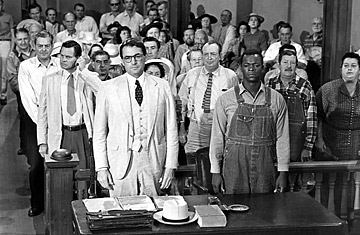
Gregory Peck, Brock Peters in To Kill a Mocking Bird, 1962.
(2 of 2)
The Pakula-Mulligan tandem's biggest hit was the 1967 Up the Down Staircase, based on the Bel Kaufman book about a New York City teacher's attempts to connect with her hard-hided students. The movie landed its leading lady, Sandy Dennis, on the covers of TIME and Newsweek the same week. After a Gregory Peck Western, The Stalking Moon, the producer-director team split. As it happened, Pakula became a director with a broader, deeper palette and somewhat greater success than his old partner (Klute, The Parallax View, All the President's Men, Sophie's Choice, Presumed Innocent, The Pelican Brief).
But Mulligan had a few more hits — and good films — in him: Summer of '42 (1971), the romance of a teenage boy and a lovely young war widow; The Other (1972), a spectral mood piece about nine-year-old twins involved in murder; and Same Time, Next Year (1978), with Alan Alda and Ellen Burstyn as annual adulterers. As his career wore on, and Hollywood jettisoned sentiment and subtlety for sharks and light sabers, Mulligan's aura dimmed. He had outlived the mood he so delicately captured.
Bittersweet Bird of Youth
Universal Pictures, the sponsor of To Kill a Mockingbird, wanted the role of Atticus to go to its top star, Rock Hudson, whom Mulligan had directed the year before in the romantic comedy Come September. But Pakula and Mulligan held out for Peck, the screen's flintiest rock of movie rectitude. Lee was in enthusiastic agreement, for she had based Atticus on her lawyer father and saw a kinship between him and Peck. On the first day of shooting she told him, "Gregory, you've got a little potbelly just like my daddy," and Peck replied, "Harper, that's great acting." Forty years later, on the star's death, Lee emerged from seclusion to testify, "Gregory Peck was a beautiful man. Atticus Finch gave him the opportunity to play himself."
Tom Robinson (Brock Peters), a black man, has been accused of raping a white woman, and Atticus takes on the case — a perilous assignment in an Alabama town in the 1930s. He offers brilliant arguments, demolishes the opposition, convinces each member of the movie audience...and loses. But Atticus has shown courage by putting his reputation on the line. Later in the film, he embodies a kind of pacifist resistance. The white woman's racist father sees him with some blacks and spits in his face. Atticus, with ferocious dignity, takes out a handkerchief, wipes off the insult and walks away. In this battle, he is the victor by refusing to fight. The force of eloquence, the power of restraint: in his display of these qualities, Atticus was a Caucasian equivalent of Martin Luther King, Jr.
Critics of the movie, most prominently Roger Ebert, say that its emphasis on the white man's burden of nobility betrayed a willful ignoring of Tom Robinson, the real person in peril. Atticus loses face; Tom loses his life, but his case is seen not as his or his race's tragedy but as one step on his lawyer's Calvary. Then the plot shifts to the Finches' eccentric neighbor Boo Radley (Robert Duvall, in his first movie role), and Mockingbird forgets about the black man, unfairly convicted by a racist society, to concentrate on the white man who is brought into civilized society.
All these vectors are at play in Lee's novel, which after all is cast not as a Scottsboro Boys-style docudrama of racial injustice in the '30s but as a daughter's loving evocation of her dad, seen through a child's eyes. This is the perspective that Foote's Oscar-winning script faithfully transposed to the screen, and that Mary Badham, who played Scout Finch, embodied with such unaffected clarity that, at 10, she received an Oscar nomination for Best Supporting Actress. As for Mulligan, no one has cited him for anything but the sensitive handling of story, actors, camera and mood.
"You never really understand a person," Atticus says, "until you consider things from his point of view. Until you climb inside of his skin and walk around in it." Tolerance ripening into fascination, and then to empathy: that was Mulligan's strength, especially in his psychological portraiture of the young. You could call him the J.D. Salinger of directors and be grateful that, in his movie heart, he stayed so young so long.
